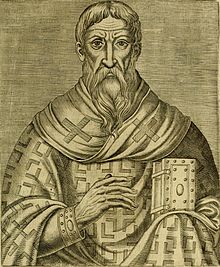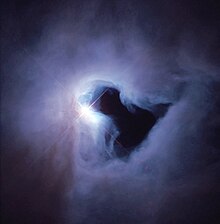Pseudo-Dionysius the Areopagite
Appearance

Pseudo-Dionysius the Areopagite was a Greek Christian theologian and Neoplatonic philosopher of the late 5th to early 6th century.
Quotes
[edit]Divine Names
[edit]
- Jones, John D. (trans.) (1999). The Divine Names and the Mystical Theology. Milwaukee, Wisconsin: Marquette University Press. ISBN 0-87462-221-2.
- The indefiniteness beyond being
- lies beyond beings.
- The unity beyond intellect
- lies beyond intellect.
- The one beyond thought is
- unintelligible to all thinking.
- The good beyond logos:
- ineffable to all logos
- unity unifying every unity
- being beyond being
- non-intelligible intellect
- ineffable logos
- non-rationality
- non-intelligibility
- non-nameability
- be-ing according to no being
- cause of being to all; but itself: non-be-ing,
- as it is beyond every being, and
- so that it would properly and knowingly
- manifest itself about itself.
- Chapter 1
- It is cause of all;
- but itself: nothing
- as beyond-beingly apart from all
- Chapter 1
Mystical Theology
[edit]
In preeminence, the cause of all that is intelligible is not anything intelligible.
- Jones, John D. (trans.) (1999). The Divine Names and the Mystical Theology. Milwaukee, Wisconsin: Marquette University Press. ISBN 0-87462-221-2.
- In preeminence, the cause of all that is sensible is not anything sensible.
- We say this of the cause of all be-ing beyond all:
- It is
- not being-less,
- not lifeless,
- not without reason, not without intellect.
- Not body,
- not figure, not form,
- not what has quality, quantity, or mass,
- not in space,
- not visible,
- not what has sensible contact,
- not what has sensation or what is sensed,
- not what has disorder and confusion,
- not what is troubled by material passions,
- not powerless,
- not subjected to what happens to sensibles,
- not light in what lacks,
- not, and has not, alteration, destruction,
- privation, diminution,
- or anything else which pertains to what is sensed.
- Chapter 4
- In preeminence, the cause of all that is intelligible is not anything intelligible.
- Ascending higher we say:
- It is
- not soul, not intellect,
- not imagination, opinion, reason and not understanding,
- not logos, not intellection,
- not spoken, not thought,
- not number, not order,
- not greatness, not smallness
- not equality, not inequality,
- not likeness, not unlikeness,
- not having stood, not moved, not at rest,
- not powerful, not power,
- not light,
- not living, not life,
- not being,
- not eternity, not time.
- not intellectual contact with it,
- not knowledge, not truth,
- not king, not wisdom,
- not one, not unity,
- not divinity,
- not goodness,
- not spirit (as we know spirit),
- not sonhood, not fatherhood,
- not something other [than that] which is known by us or some other beings,
- not something among what is not,
- not something among what is,
- not known as it is by beings,
- not a knower of beings as they are:
- There is neither logos, name, or knowledge of it.
- It is not dark nor light,
- not error, and not truth.
- There is universally neither position nor denial of it.
- While there are produced positions and denials of those after it,
- we neither position nor deny it.
- Since,
- beyond all position is
- the all-complete and single cause of all;
- beyond all negation:
- the preeminence of that
- absolutely absolved from all
- and beyond the whole.
- Chapter 5
See also
[edit]- Apophatic theology (negative theology)
- Nothingness
- Heart Sutra

